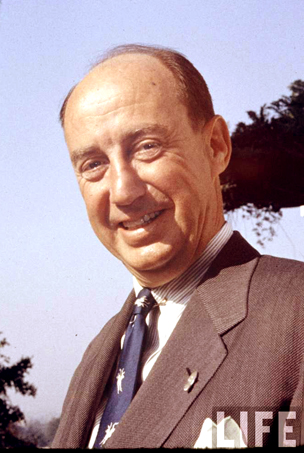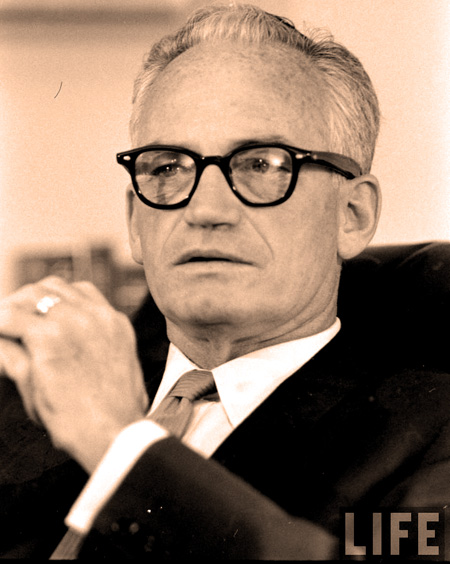Barry Goldwater(Republican), 36th President of the United States, 1962-1969
Presidents don't just die. Guns are drawn and they're cut down by anarchists and Rebels. They ail after a long illness. Presidents, especially ones with such a bright future as Richard Nixon, don't simply fall off a stage and die.
Yet he did. The nation was gripped by shock and disbelief. President Goldwater solemnly took the Oath of Office in front of the TV cameras and a new age dawned. Or maybe it didn't, and things were only ever going to turn out one way. Whatever the reason, American politics, in the popular(if not historical) consciousness, was forever divided into pre- and post-Nixonian eras.
Goldwater promised stability and continuity in the transition, leaving the Cabinet untouched and promising a renewed march of the forces of freedom against the Communist hordes. However, he quickly backed away from many of Nixon's economic stances. He knew that it was impossible for him to roll back the Federal government, but he certainly could stop its growth. Considering the economic growth, it wouldn't even be unpopular. Things were working, why change them?
The United States under Goldwater pursued one of its most aggressive foreign policy stances ever. Of particular note is the lack of any condemnation of Doc Lynch as he put Cuba to the sword in an effort to crush "counterrevolution", both real and imagined, and reorganized the economy into a corporatist state fusing the interests of Lynch himself with American business interests.
However, of late there has been a focus on the US intervention in the Katangan War, with American air support on the side of the Katangans. It is no wonder that to this day the Katangan Parliament building sits on Goldwater Square and LeMay Boulevard. While today the immense danger of disproportionate escalation by superpowers is realized(for obvious reasons), at the time it was judged by the American people by the results it yielded(ie a rollback of Communist states and containment of Communist movements), and did not affect Goldwater's popularity.
The greatest failure of the Goldwater administration, however, will always be remembered as the prevention of South Chinese nuclear proliferation, first publicly known with the Southern Wind nuclear test of 1967. While Goldwater was livid at the implication that the South Chinese felt the American nuclear umbrella insufficient, once the nuclear genie was out of the bottle, there was no way for him to publicly reign them back in, their position unstable as it was.
There were some successes, however. The opening of India in 1964 following the death of Soviet-aligned President-for-Life Menon(thanks in part to some grunt work by the ultimate Company Man, Frank Carlucci), is still viewed today as one of the pivotal points of the Cold War. Also of note are the Salzburg Accords of 1963, which reintegrated France into TACO in exchange for free elections and an end to the French nuclear program, which caused many in Europe to breathe easier.
On the domestic front, there was a general consensus that the next step was a civil rights act. This is where the consensus ended. The liberals of both parties in Congress wanted a comprehensive bill, ending segregation and voter suppression once and for all. The Southern Democrats were, by and large, dead set against any challenges to white supremacy, no matter how minute. Goldwater(and most of the conservative Republicans) was somewhere in the middle. While not a segregationist, he was against any law perceived as meddling in the affairs of private businesses, skeptical the the root problems of civil rights were solvable by legislation, and cautious towards any kind of sweeping legislation in general.
The end result of this was the Civil Rights Act of 1963, which withheld all forms of federal funding from any organization, public or private, that discriminated based on "race, color, or creed", as well as set up an independent board to investigate attempts to suppress the black vote and act accordingly, as well as designate certain areas of the country as worthy of additional attention.
United States Presidential Election, 1964
The road to 1964 was chaotic, the Democratic National Convention more than anything else. Split between hawks and doves, segregationists and integrationists, fiscal liberals, moderates, and a few conservatives, all with precious few powerful personalities to hold the line. Johnson was a national punchline. Kennedy hadn't been seen in public since the passage of the Civil Rights Act, citing health concerns and was currently facing pressure to resign. The Democratic Whip, Humphrey, knew things would be messy and decided to wait for calmer times. Three figures emerged at the Convention- Happy Chandler, Scoop Jackson, and George Wallace. Chandler was the fiscally conservative, integrationist Governor of Kentucky. Scoop Jackson, Senator from Washington, combined one of the most liberal voting records on economics and civil rights with the most conservative on foreign policy. Wallace, the Alabama governor notorious for impeding US Marshals after
Wilson v. Board was running on one issue and one issue alone: segregation forever. They were deadlocked. Chandler's ego precluded him from taking any post but the top of the ticket, but his economic views were far out of step with the Democratic base. Wallace didn't mind where he was provided he could be in a position to roll back civil rights. Jackson didn't mind either, and while his views on foreign policy were somewhat heterodox, hawk Democrats were nothing new, and many Democrats yearned for a fresh start on foreign policy. After dozens of unchanging ballots, Chandler, accepting the political reality and realizing that this was his last of many chances to break into the executive branch, relented, endorsing Jackson for the Presidency. The Democrats nominated Jackson for President and Chandler for Vice President. Wallace, furious, stormed out, forming his own 'American Party', and vowing to deadlock the Electoral College.
Despite initial gains, the campaign went poorly for the Democrats. Wallace and his running mate, Thurmond, decided that Goldwater would be easier to work with than Jackson if the Electoral College was hung and campaigned accordingly, rolling in a series of populist bread-and-butter fiscal policies designed to appeal to blue collar whites in the industrial north, and campaigning in select northern cities- Cincinnati, Chicago, and Pittsburgh in particular. The efficacy of this was debatable- Jackson won Pennsylvania regardless and Goldwater's margin of victory in Ohio was greater than Wallace's share of the vote. In Illinois, however, Goldwater netted only 47%, with Jackson getting 46.5% and Wallace getting the rest. Illinois was doubly contentious due to Goldwater's running mate, Senator Dirksen. Goldwater tried to remain above the fray, citing his duties as President and reminding voter's of Nixon's legacy. While voters may have been closer to Jackson than Goldwater on economic issues, the latter hadn't tried anything too drastic and capitalized on the growing economy, while Jackson's hawkishness seemed too close to 'me-tooism' for many swing voters. Meanwhile, the Democratic campaign was embroiled in scandal following allegations of improper handling of the Kentucky's finances by Governor Chandler. Chandler tried laughing it off and ignoring it, but what worked in Kentucky didn't work nationwide. Pressures mounted, and while nothing concrete was ever proven, the press needled Chandler throughout the campaign, and the event tarnished his name in Middle America.
Even with this, the facts remained that Goldwater was indeed out of step with the American public on economic issues. However, his foreign policy kept his polls high for swing voters, and, perhaps more crucially, Goldwater was saved by the Outer South: though he never cleared more than 45% of the vote in any state in the region, he was able to sweep with a plurality due to heavy competition between the Democratic and American campaigns.
Like most Presidents, Goldwater waned in his second term. Crippled on economics by a liberal Congress and unwilling to take any more action on civil rights, politics remained deadlocked at a deep level. Foreign interventions did taper off somewhat due to lack of targets, improving his image in the mind of the American people, though this was tempered by the South Chinese nuclear test. In the end, he met the same fate of nearly all Presidents at the end of their second terms- at best, an irrelevancy. Still, Americans would look at the Goldwater years with pride compared to what came next.










